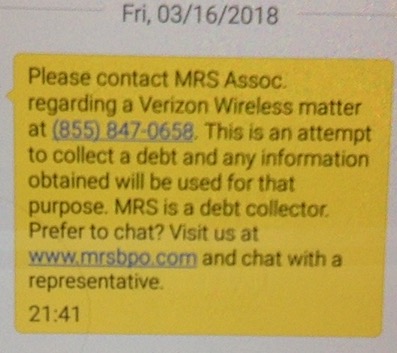Well since JoeTaxpayer's answer seemed to uncover a "legitimate" (my quotes not his) collection agency, why not request documentation of the collections account?
It may not be a scam. Are you certain the family has no debts? Maybe there has been identity theft and the collections account does in fact exist. Most debt collectors websites I have seen are pretty generic so that may not be a good signal.
As for calling and getting directed to an online chat, that makes a lot of sense from the company's perspective. I'M NOT SAYING THIS IS A LEGITIMATE COMPANY. However, I can understand how a chat session would be more useful to a collection agency. There is a written record and information about the collections could be copy-pasted, thereby making the collections agent life's easier.
I have taken over a phone number which was a great number it was easy to remember and hard to mispronounce. It was also previously held by a person who had a lot of legal and collections issues. I fielded calls from bounty hunters, collection agencies, court process servers, random angry people and quite a few lady friends who shared explicit content.
As for any collections efforts, my understanding is it is illegal under some FTC law (I'M NOT A LAWYER!) to autodial a cell phone. This may pertain to texts also, I'm not sure. I either answered the phone or called them back if I got a voicemail.
I followed this script: "Hi, how's it going? Yeah I'm not sure who you are looking for, what's their name again? Huh, OK and what state is your office located in? Ok and what's your name? Ok and do you have an employee ID number? What is that number? BUT WRITE ALL THAT INFO DOWN!
OK , thanks for that info. Yeah that person no longer has this phone number or never did, I'm not sure. Anyways, I'm not them. I do not know nor have I ever known that person. Please take me off your contact list for this person immediately.
Also, just so you know it is against FTC law to autodial cellular phones. Did you enter this text message manually? It looks autogenerated. Anyways I'm sure your job is hard enough without FTC violations in the mix.
OK, so I hope you have a nice shift, sorry I couldn't help. Again, please remove this number from your records. Thank you, hope your day goes well! "
I have only had a few call me back twice. At that point I mentioned I would write a letter to their state's attorney general's office regarding autodialing cell phones. Never heard from them a third time.
Also, keep in mind people give bogus contact info for things all the time. Getting a new phone account? Have bad credit and need the contact info of a few "relatives" or cosigners? Just make that info up!
You can always send a letter to their business address requesting a validation of the debt. Many templates online for a letter of that type.

